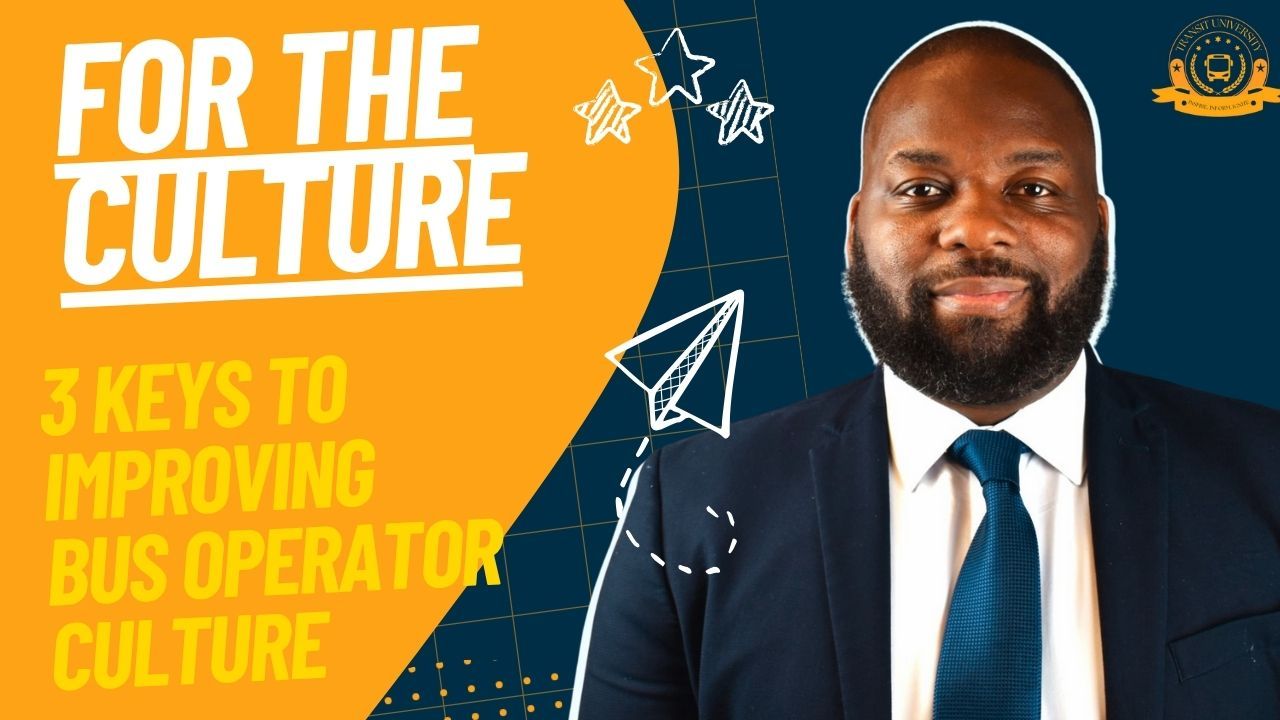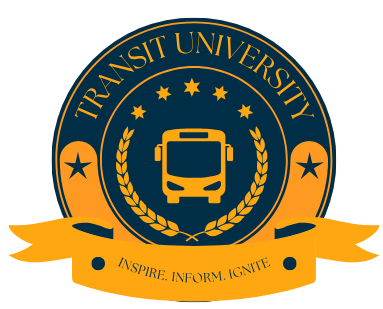
For The Culture : Three Keys To Improve Bus Operator Morale
Jun 23, 2025On paper, being a bus operator looks like a dream job. Good pay? Check. Benefits? Yep. Job security, pension, union protection? All there. Honestly, it’s like someone read every Reddit thread about what employees want in a job and built it into one role.
So why is the culture so bad?
Walk into most garages and the mood is heavy. It’s not pride or energy—it’s survival. People are burned out. New hires don’t stick. Long-timers are just counting down the days. The benefits are there, but something deeper is missing. Here’s the thing most folks don’t realize: there is no real culture. And when you don’t set a culture, it sets itself—and usually not in a good way. Most jobs come with a vibe. Say “office job” and you picture coffee breaks, awkward birthday cards, and Zoom fatigue. Say “tech startup” and you see hoodies, kombucha, and standing desks. But say “bus operator” and… what comes to mind? Not much good. People think of rude passengers, impossible shifts, and management that doesn’t get it. There’s no positive shared identity—no “this is how we do things” in a way that builds pride. Instead, the culture defaults to survival mode: do your shift, avoid problems, and get out. That’s a problem—because culture isn’t just a vibe, it’s a system. It gives people purpose, belonging, and pride. Without it, all that’s left is frustration, burnout, and a job that’s just a job. It also doesn’t help that transit is weirdly intergenerational. Where else do you see 21-year-olds and 70-year-olds doing the same job, side by side, with no clear mentorship or progression between them? Sounds cool in theory—like wisdom meets fresh energy—but in practice, it’s messy. Think of a rowboat: it doesn’t matter how talented someone is. If everyone’s rowing at a different cadence, you’ll end up just spinning in circles. (Thanks Roxana 😉) And maybe the biggest issue? There’s no accountability system. Being a “good” operator just means showing up and not crashing the bus. That’s it. There’s no finish line, no promotion path, no reward for doing great work. Raises and recognition aren’t performance-based—they’re seniority-based. So most folks do just enough to stay out of trouble and wait for a better assignment to open up. It’s a culture focused on avoiding failure, not chasing success So yeah, the benefits are great—but the culture? It’s holding the whole thing back. That doesn’t mean it’s hopeless. Here are three keys that could shake up bus operator culture for the better—and actually make the job feel as good as it looks on paper. If watching professional wrestling has taught me anything, it’s that every successful operation needs a face of the product. And while that might sound like it only applies to sports entertainment, this model shows up everywhere. Think about it—the machine, the product, the entire vibe often builds itself around a central figure. Look at the NBA. Michael Jordan’s era was built around dominance, grit, and individual greatness. Steph Curry’s NBA? It's about speed, shooting, and team dynamics. The game shifted because the face of the league changed—and with it, the product evolved. The reality is, someone has to drive the boat and set the vision. On the administrative side of transit, we often take our cues from the top. If leadership rules with an iron fist, the entire operation tends to reflect that. If they lead with trust and respect, the culture follows suit. That brings me to something I came across a while ago that still sticks with me. I was reading A Promised Land by Barack Obama, and there’s this moment in the book that really resonated. He talks about how, early on, it was tough to get people to buy into his vision. It didn’t matter how smart his proposals were or how solid his plans looked—it just wasn’t connecting. Then he had a realization: being President wasn’t just about having the best policies. His job was to be a symbol of hope. Someone people could relate to and believe in. That insight is profound. And coming from someone who held the world’s highest office, it reminded me of a core truth: it’s not just about having great ideas—it’s about being someone others want to follow. That’s something bus operations could use a lot more of. People don’t just want managers or supervisors. They want leaders. People who inspire, who set the tone, who make others feel part of something bigger. From sports to politics to public transit—the principle is the same. One big reason operator culture suffers? The disconnect between admin and frontline staff. Most events in transit feel top-down—like Operator Appreciation Day or Transit Workforce Day. These are nice gestures, but often they feel… scripted. Like boxes being checked. Where are the casual, real moments? Why not something more laid-back—like “grab a coffee” or “catch up over tacos” type of days? No big agenda. No HR talking points. Just people, talking. This happens all the time on the admin side. Offices have happy hours, team lunches, impromptu Starbucks runs. Why not extend that same energy to the garage? Yes, scheduling is tricky. Long hours and split shifts make things tough. But if we cared enough, we’d figure it out. The truth is, the culture often feels like, “We say, you do.” And that gap between operators and admin? It’s wide. There’s very little overlap, and hardly any genuine relationships. And when there’s no relationship, there’s no understanding. It’s like the difference between taking my wife to dinner because I genuinely want to spend time with her, versus taking her out just because my calendar told me to. One builds connection; the other checks a box. People don’t just want to be managed—they want to be wanted. They want to feel like they matter, like someone actually sees them. Imagine if a scheduler casually asked a few operators over wings and fries, “Hey, what would make your route easier?” That kind of honest exchange can lead to real innovation. It doesn’t need to be a company-wide summit—just two people chatting with mutual respect. Operators and admin don’t need to be best friends. But if we saw each other as human beings and teammates—not just job titles—we’d be on our way to a healthier, more connected culture. Another reason culture breaks down? Operators often feel powerless. They’re told what to do, how to do it, and when to do it—with little say in the process. That kind of structure kills pride and ownership. How many times have you heard an operator say, “I’m just a bus driver”? That phrase speaks volumes. It reveals a mindset shaped by years of being treated like a cog in the machine, not a professional with insights and experience. But what if we flipped that? What if operators had more voice in the system? Imagine letting them share ideas on improving routes, shift structures, or safety processes. Give them the space to lead feedback sessions, propose new efficiencies, or even mentor newer drivers. When people feel trusted and respected, they rise to the occasion. They take pride in their work. They go the extra mile because they know their input matters. They stop saying “just a driver” and start saying “I help run this thing.” Empowerment doesn’t mean chaos. We still need structure and standards. But when operators have even small opportunities to lead, suggest, or influence decisions, the ripple effects are powerful. It fosters ownership, loyalty, and ultimately—a stronger, more united workforce. Improving bus operator culture isn’t about reinventing the wheel. It’s about building relationships, creating shared values, and giving people purpose beyond the paycheck. By highlighting the right kind of leader, encouraging authentic interaction between teams, and empowering operators to shape their work, we can spark a cultural shift that benefits everyone—from the drivers to the passengers to the public. This isn’t a pipe dream. It’s totally possible. And the payoff? Huge. When operators feel connected, supported, and valued, they stay longer, perform better, and build stronger communities through their work. So let’s start small. Let’s start now. Because when we invest in culture, we invest in people—and that’s what drives everything forward. What’s one change you think would make the biggest difference in improving bus operator culture, and how do you think we can start implementing it today? What are some of the things your agency has done to improve its operator culture?
🗝️Key One: Get a Leader
🔑Key Two: Create More Cultural Events Between Operators and Admin Staff
🔑Key Three: Empower Operators to Make Decisions
Closing Thoughts
Don't miss a beat!
New moves, motivation, and classes delivered to your inbox.
We hate SPAM. We will never sell your information, for any reason.

